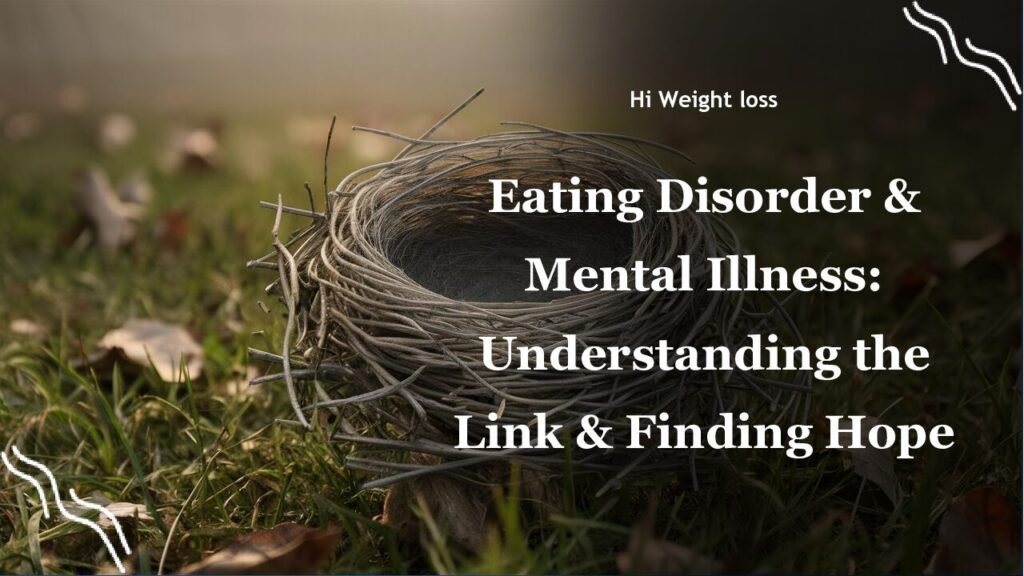Are you questioning if your struggles with food and body image could indicate a deeper issue? It’s a scary thought, wondering if your relationship with food might mean you’re dealing with a mental illness. This article will explore the connection between eating disorders and mental health, helping you understand the symptoms, treatment options, and how to seek help.
Am I Mentally Ill if I Have an Eating Disorder?
That question is incredibly valid and one that many people grapple with. The short answer is that, yes, an eating disorder _is_ considered a mental health condition. But it’s not about “being crazy” or “lacking willpower.” Instead, it’s about complex patterns of thinking and behaving that need professional attention and care. My friend Sarah, who struggled with bulimia for years, used to think her issues were just about her weight. It wasn’t until she started seeing a therapist that she realized the depth of the underlying mental and emotional struggles that were fueling her eating habits.
Understanding Eating Disorders as Mental Illnesses
Eating disorders, such as anorexia nervosa, bulimia nervosa, binge eating disorder, and other specified feeding or eating disorders (OSFED), are serious mental illnesses characterized by disturbed eating behaviors and distress about body image or weight. These aren’t merely “dieting gone wrong.” They involve complex interactions of genetic, environmental, and sociocultural factors that affect both your mind and body.
The American Psychiatric Association recognizes eating disorders as mental illnesses, and they are included in the DSM-5, a standard reference for diagnosing mental health disorders. The DSM-5 outlines specific criteria that mental health professionals use to diagnose these conditions, making it clear that they fall within the realm of mental health care.
Think of it like this: if someone has diabetes, you wouldn’t blame them for not producing enough insulin. Similarly, if someone has an eating disorder, it’s not a matter of personal failing. It’s a real mental health condition that requires understanding and professional intervention.
Mental Health and Eating Disorders Symptoms
It’s important to recognize the signs of eating disorders. They’re not always as obvious as you might think. Symptoms vary depending on the specific disorder, but there are common threads that indicate a link between eating and mental health struggles.
Some common symptoms include:
- Preoccupation with food, weight, and body image
- Extreme dieting or restriction of food intake
- Binge eating episodes
- Compensatory behaviors such as excessive exercise or purging
- Distorted body image
- Changes in mood and personality (e.g., irritability, anxiety, depression)
- Social withdrawal
These symptoms are not simply about food. They are often fueled by underlying emotional distress, low self-esteem, perfectionism, or the desire to control some part of your life. I remember when my cousin, Emily, started becoming very secretive about meals and constantly talked about her weight. Looking back, it’s clear she was struggling, and those were not just “quirks.”
It’s not only about the behaviors you exhibit but also about how you feel inside. Do you feel intense guilt or shame after eating? Are you constantly weighing yourself or scrutinizing your appearance in the mirror? These emotional states are strong indicators of the underlying mental health component of eating disorders.
The Serious Consequences of Untreated Eating Disorders
The mental and physical consequences of an eating disorder can be serious and even life-threatening. According to the National Institute of Mental Health (NIMH), eating disorders have the highest mortality rate of any mental illness. Untreated eating disorders can lead to severe physical problems such as malnutrition, heart problems, kidney failure, and digestive issues.
On the mental health side, they often coincide with anxiety, depression, substance abuse, and increased risk of self-harm and suicidal thoughts and behaviors. The impact on an individual’s overall well-being is far-reaching, impacting their ability to work, attend school, and maintain relationships.

Eating Disorder Mental Health Treatment Options
The good news is that eating disorders are treatable, and full recovery is possible. Treatment usually involves a combination of therapy, nutritional counseling, and medical monitoring, and medication may be needed, depending on the situation. There are several different mental health treatment options.
Here’s a breakdown of common treatment options:
| Treatment Type | Description |
|---|---|
| Cognitive Behavioral Therapy (CBT) | Helps identify and change negative thought patterns and behaviors related to food and body image. |
| Dialectical Behavior Therapy (DBT) | Focuses on emotional regulation, distress tolerance, and mindfulness to manage urges and emotions associated with eating behaviors. |
| Family-Based Therapy (FBT) | Engages family members in the treatment process, often used for adolescents with eating disorders. |
| Nutritional Counseling | Provides guidance and support to help restore healthy eating patterns and achieve a balanced approach to food. |
| Medication | May be used to address co-occurring mental health issues such as anxiety or depression. |
It is crucial to seek professional help if you suspect you have an eating disorder. A healthcare provider or mental health professional specializing in eating disorders can conduct a comprehensive assessment and recommend the most appropriate treatment plan. Remember that this is not something you have to go through alone, and help is available. I’ve seen how transformative treatment can be through a close family friend, whose recovery journey was a testament to the power of therapy and support.
Conclusion
So, is having an eating disorder a sign of mental illness? Absolutely. It’s not a reflection of your character or a lack of discipline but a complex mental health condition that requires professional help. From understanding that your feelings about food go beyond just “dieting” to seeking and committing to a treatment plan, each step you take is incredibly brave and worthy. Sarah, my friend, not only recovered but is thriving today. She uses her experiences to encourage others to seek support. Recognize the signs and symptoms, and don’t hesitate to reach out for help. You deserve a life free from the grip of an eating disorder. Remember, recovery is possible, and you’re not alone in this journey. Share this article with anyone you think might benefit from understanding this important issue.
FAQ
Can you recover from an eating disorder?
Yes, full recovery from an eating disorder is possible with the right treatment and support. It’s not a quick fix, but with persistence and care, many individuals can heal and lead healthy lives.
How do I know if I need help?
If you are struggling with thoughts about food, weight, or body image that are causing you distress or impacting your daily life, it’s a good idea to seek professional help. Even if you’re not sure you have an eating disorder, a mental health professional can provide support and guidance.
What if I don’t think my eating problems are “that bad?”
Eating disorders come in different shapes and sizes, and even less obvious cases can be dangerous. It’s always better to seek help sooner rather than later. A professional can assess your situation and provide appropriate support.
Where can I find help for an eating disorder?
You can find help through your primary care physician, a therapist, or by using resources like the National Eating Disorders Association (NEDA). They can connect you with support in your area.
Can family and friends help someone with an eating disorder?
Absolutely. Family and friends can play a huge role in supporting someone with an eating disorder. Encouraging them to seek help, being understanding and patient, and avoiding diet talk or body shaming is essential. The NEDA’s Parent Toolkit is another great resource.



